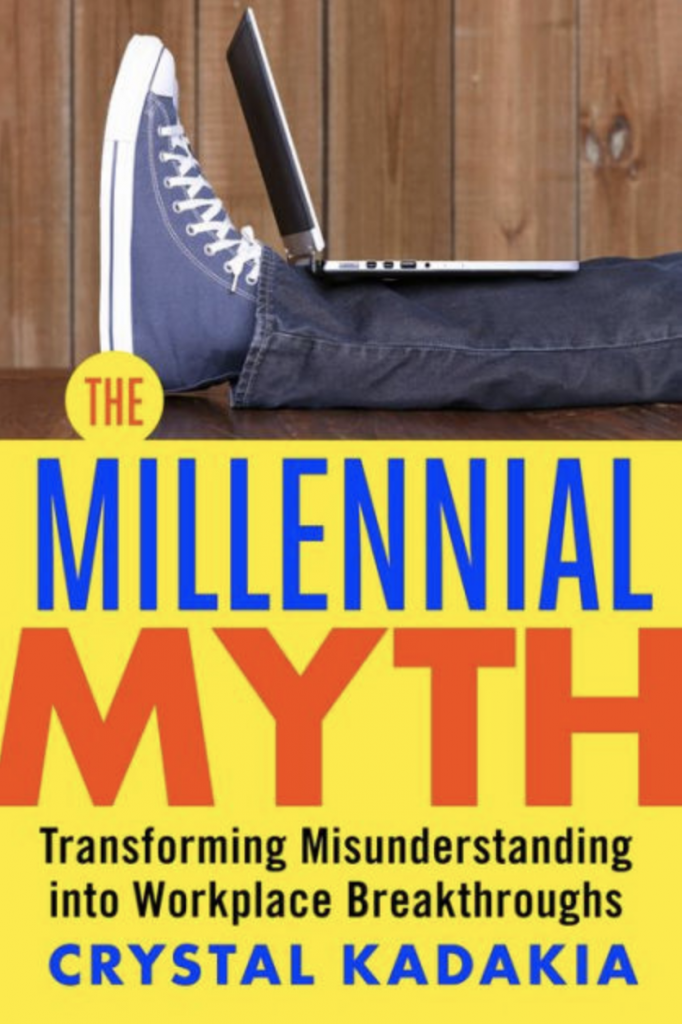Key Quote:
“Through this pivotal time of generation transition and digital transformation, some companies will become a Blockbuster, some a Netflix. Do I need to even ask which one you want to be?” (p. 15).
Key Points:
Rebuilding the Backdrop for Millennials. Each generation is in part a product of the events and trends that happened during our childhoods. Millennials have been impacted by a higher birth rate than Gen X, technological advances during childhood, the growth of “nonroutine” jobs, and greater social and economic diversity between families of origin.
It’s Not Lazy, It’s Productivity Redefined. Time spent working and productivity do not necessarily correlate. It is better to shift from a strict 9-5 work model and instead define productivity in terms of meeting goals.
It’s Not Entitled, It’s Entrepreneurial. Millennials are driven by more than just a paycheck and see a job as a place to use and grow their potential, and they are willing to pursue outside-the-box opportunities in following their passion and making a living. Employers can leverage this entrepreneurial spirit to develop into modern organizations and grow, by engaging in “intrapreneurship” within their companies – encouraging “innovation, creativity, and learning” in every role.
It’s not Hand-Holding, It’s Agility. To older workers, seeking constant feedback can appear to be a residual crutch the “trophy generation” is leaning on into adulthood. But for millennials, feedback is a form of learning and it helps them develop and adapt to situations in real time. Organizations can make the most of this by incorporating opportunities for training and learning programs.
It’s Not Disloyal, It’s Seeking Purpose. Millennials have a reputation for job-hopping, but loyalty is a two-way street, and it is built with a shared belief. Loyalty is fostered when millennials believe they and their company have a shared sense of organizational purpose, understand how their company benefits society, and see ties between their company and their community.
It’s Not Authority Issues, It’s Respect Redefined. While some millennial behaviors are perceived as disrespectful by older generations, in an age when knowledge and information change constantly, millennials simply value a more open, collaborative approach. Millennials thrive in environments where all the generations can come together to “converse, connect, and collaborate” and asking questions is not intended to challenge or attack you personally but to learn and engage.
A Millennial-Inspired Modern World. A Kadakia says, “what if we all acknowledged and embraced the momentous difference digital technology has created? What workplace could we create together” (p. 139)?
Key Concepts:
Modern Workplace Culture
Businesses that adhere to the stereotypes about millennials in the workplace fall prey to the dangers of preexisting bias. This bias has measurable drawbacks:
• Higher cost due to turnover
• Lack of bench strength, leadership pipeline
• Loss of core knowledge
• Decreased employee engagement
• Decreased access to top talent
The onset of the digital age has shaped the workplace drastically, and as innovation occurs more rapidly, there is a need to integrate and modify expectations faster. Recognizing and playing to the strengths of millennials is integral to developing an organization.
It’s Not Lazy, It’s Productivity Redefined
Millennials are not averse to hard work, rather they have varying ways of accomplishing work. The desire to work when, where, and how they want is often perceived as laziness. However, millennials have simply redefined productivity, free of the confines of the 9 to 5 workday spent
sitting at desks.
Focusing on the goal itself, not necessarily how, when, and where it is accomplished, promotes greater creativity over time. Therefore, when millennials are permitted to work outside of traditional confines, they achieve goals in more innovative ways.
It’s Not Entitled, It’s Entrepreneurial
This trophy generation has grown up being told “money does not equal happiness,” “follow your passion,” and “you can do anything.” As a result, there has been a wave of millennials labeled as entitled, when it is, in fact, a generation of entrepreneurs.
Kadakia highlights the distinction between entitlement, which is the belief that one is innately deserving of things, and self-advocacy, which is the recognition and representation of one’s worth. Self-advocacy is as important as innate talent, which means understanding a candidate’s potential and passion.
To harness the entrepreneurial spirit and promote innovation, “think and act like a startup, while scaling up like an enterprise” (p. 72).
It’s Not Hand-Holding, It’s Agility
Millennials’ desire for feedback is a show of agility because they want to acquire information quickly and frequently to be able to do their job as efficiently as possible. It’s their way to gain experience and insight into a role or company more quickly.
Growing up in an age of constant technological advancements, millennials have always had to adapt and build skills rapidly. Their need for feedback “serves a single, critical purpose: it allows one to course correct, to be agile in the moment. If you wait around for the answer, time is lost that could have otherwise been spent leveraging the answer” (pp. 85-86).
Businesses should learn to leverage this agility by using ongoing feedback as a managerial tool.
It’s Not Disloyal, It’s Seeking Purpose
Companies today have become so profit-focused, they neglect to invest in earning employee loyalty. Conversely, millennials are focused on finding fulfillment and are concerned with how their work benefits the broader community. To engage this generation, organizations must invest in garnering loyalty. Kadakia suggests a way to do this is to highlight corporate social responsibility, focusing on how business goes beyond profit.
“Organizations that help [millennials] discover and leverage their strengths and passions, while having a clear commitment to valuing employees, have a distinct advantage with talent that has witnessed the recession” (p. 28).
It’s Not Authority Issues, It’s Respect Redefined
Workplace hierarchy still exists, but instead of earning respect based on job level, tenure, and age, respect is rewarded for actions and accomplishments. Millennials recognize this shift and approach workplace relationships from a peer-like point of view.
Organizations should embrace the peer approach to employees because “transparent, collaborative leaders lead more profitable, engaged, happy workplaces” (p. 119).
Modern Workplace Adaptivity
“Although millennials could be perceived as lazy while looking through a traditional lens, the more useful, modern perception is that millennials have responded intuitively to the changes that have occurred in the way we work, what we work on, and the goals we work towards. For today’s highly cognitive, nonroutine jobs and egalitarian world, workplace flexibility, not rigidity, is the key to increasing productivity” (p. 50).
Businesses that choose to view the current generation only as defined by their stereotypes without understanding what they have to offer, will also fail to engage future generations.
Kadakia, C. (2017). The Millennial Myth: Transforming Misunderstanding Into Workplace Breakthroughs. Oakland: Berrett-Koehler Publishers, Inc.

Employers can leverage this entrepreneurial spirit to develop into modern organizations and grow, by engaging in “intrapreneurship” within their companies – encouraging “innovation, creativity, and learning” in every role.
Workplace hierarchy still exists, but instead of earning respect based on job level, tenure, and age, respect is rewarded for actions and accomplishments.
